Combating Trauma Through Art: Interviews With Jeffrey Wright & Vainuupo Avegalio Of WE ARE NOT DONE YET
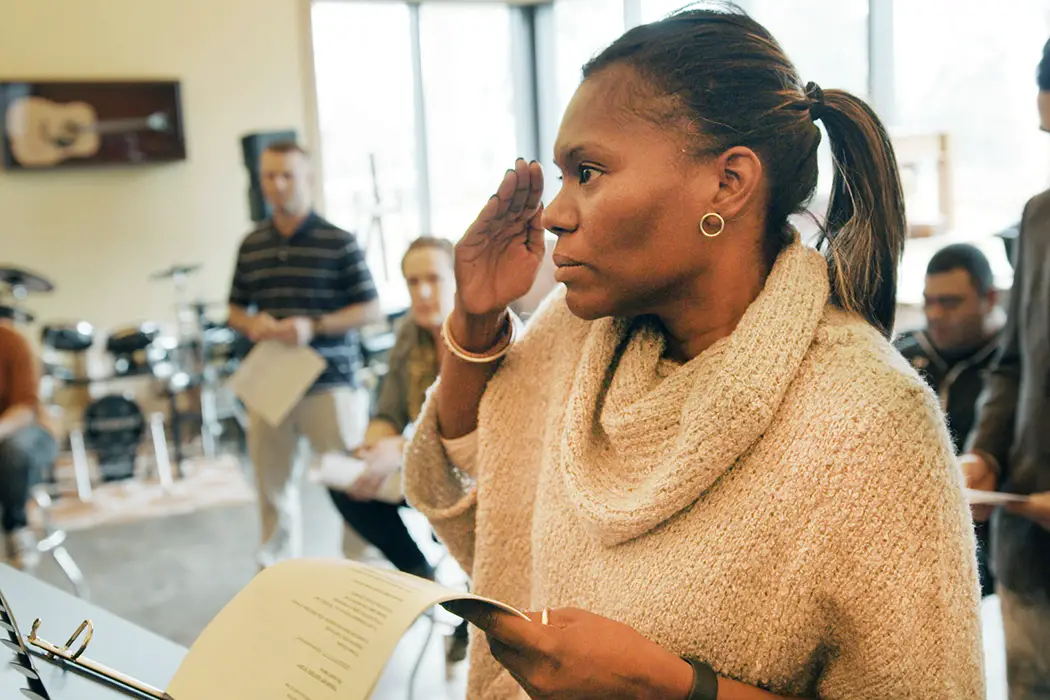
Kristy Strouse is the Owner/Editor in Chief of Film Inquiry,…
The documentary, We Are Not Done Yet, follows a group of retired and active service members, from different branches of military, all with varying traumas, as they come together to create a collaborative poem. It’s a meaningful portrait of vulnerability and redemption, and it’s also a wake up call for those watching.
Bonded In Duty
Throughout the 50 minutes we are introduced to some of the participants, and we are given their stories through an intimate delivery. It also shows multiple stages of the process as they meet for workshop sessions and rehearsals. The conclusion of the film is their performance, which is both emotional and inspiring.
Actor Jeffrey Wright is one of the producers on the project and is very hands on throughout the process. Wright has been blazing the screen for many years in films like Basquiat, The Hunger Games Series, Casino Royale and the recent Hold The Dark (to name some). He’s also received Emmy nominations for his part in HBO’s Westworld, and had a prominent role in Boardwalk Empire. Here, the actor uses his knowledge of the arts to help prepare the service members for their live performance.
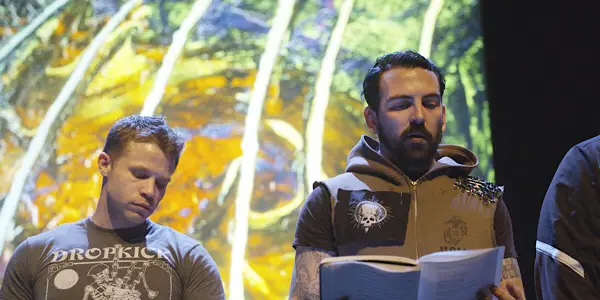
The documentary also captures some very personal stories, ranging from conflicts in war to conflicts at home. There’s also a harrowing account of sexual abuse from within the military, which is a heartbreaking, but necessary listen. I could tell you about each of these brave and unique individuals, but I recommend you tune in and watch it for yourself. Director Sareen Hairabedian and editor Abhay Sofsky do a tremendous job of splicing together confessional moments with some of the participants to the act of creating this powerful piece.
Bonded In Inspiration: We Are Not Done Yet
There’s a journey, but there is also a lot unsaid. I could have watched more, heard more, and still wouldn’t have been satiated. This program, coordinated by poet Seema Reza, who is part of the veterans art group Community Building Arts Works, is an important one.
As the participants work through their pain to produce a poignant perspective, there’s also a light shed on programs such as these, which are in danger of losing funding and are being censored.
This is also a terrific example of how incredible the arts can be as a way of moving through difficult emotions and experiences with expression. There’s a raw and honest center to these stories, as they each persevere. It’s also evident the connection this group builds as they relate through each of their hardships and service for their country, as they find a common ground: hope.
As someone who has veterans in their family and has heard stories similar to those in this documentary, this film was incredibly moving. This is a platform for veterans to have a voice, but also for the rest of the world to listen.
This chronicling of their journey shows the healing process of art, and provides a voice to those suffering from PTSD. In that way, as you watch, you’ll not only find compassion for these brave individuals, but you’ll also find yourself in their plight.
This is a film for everyone. We all have trauma, and we should all support one another. These are also courageous and compelling people. As the title suggests, they are not done yet, and as a society, we’re just beginning to recognize how to heal.
I was able to speak with Jeffrey Wright and retired US Army Sergeant Vainuupo “A.V.” Avegalio about the project, how it got started, what it meant to them, and what they are hoping it will mean to audiences.
Kristy Strouse for Film Inquiry: Thanks for taking the time today, and A.V, thank you for your service! This is a very moving project to watch you create, and the performance was amazing. Jeffrey, I can tell that this is a passion project for you. Can you talk a bit about how this came to be and how you got involved?
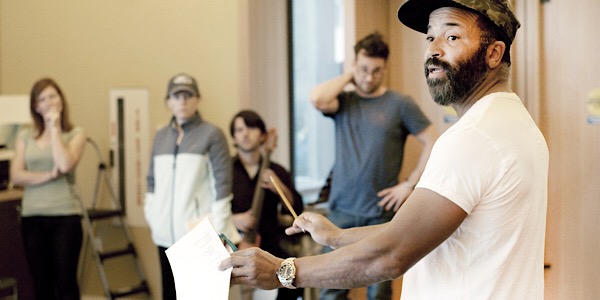
Jeffrey Wright: Yeah, I guess the short story is I kind of grew up a little bit, [laughs] and it became a more aware thing that I might have taken for granted before. I’m more sensitive and respectful of veterans, and more attuned to the consequences of war on veterans and some of the challenges they face. I guess I became more aware, particularly relative to the way it would be in larger society, as they either ignore or misrepresent those things. I happen to, over the last eighteen years or so, build relationships with a number of veterans of US military and other places through work that I did in Sierra Leone over a long period of time when I visited that country while it was at war. So, my interest through it, it brought me closer to these issues and ultimately to this work.
I think there’s a lot of superficial chatter and campaign sloganeering, and platitude that gets layered over issues related to vets. We hear a lot of talk but some of it’s a challenge, and remains untouched, and it has this generational lifespan, and so it seems to be a disconnect between the way we in the American public talk about these things and the reality that the veterans face. So, this work was an opportunity for me to be more vocally involved and also at the same time, educate myself further. And the film was born out of that and I hope that by the access to voices, those being the voices of veterans, that it cuts through the noise and nonsense and falseness that we exhibit too much in the space from people on the outside.
Great Answer! I hope it does too. It’s a very meaningful piece. A.V., can you tell us a bit about your personal experience along the way?
A.V.: The experience of all of this was, wow. You know you have your ups and downs. Your feelings of… wondering how the public will take it. And also our fears within ourselves, but also of our families. Those of us who invited our family members to that space. You don’t really talk about it back home, to our families about whats going on, and you kind of just hide it. Allowing them to actually come in and hear what’s going on, that made me nervous in itself. But, I think at the end of it all, at least for myself that it was very… I want to say, that it took a lot of the weight that I was carrying around in my heart and in my mind, and kind of gave it a place to go. And it helped. It eased the hurt, and the feelings of the guilt and the shame. It helped ease some of that. And for me, I guess, it made me feel less burdened by it. I hope that make sense.
Yes, it definitely makes sense! Well put. I can imagine it was a difficult process. I believe in the power of art and word as a form of healing. You’re also an artist too right?
A.V.: Yes ma’am.
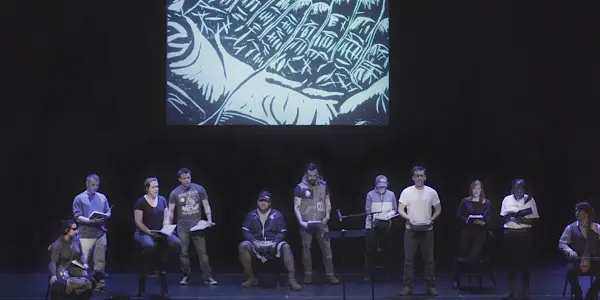
What kind of work do you do?
A.V.: A bit of a variety. Actually, I don’t have one discipline. I kind of dabble in a lot of different things because I get bored easily, my mind doesn’t stay put. It’s always on the run. So, I do a lot of acrylics, oil, and I just recently starting to pick up glass. I work a lot with resin. It’s endless. I think that’s what I love about the arts: the possibilities are endless.
I agree! Are you still in contact with everyone you worked with on this project?
A.V.: It is a tight-knit group. We are always checking in on each other. “How’s everything going?” “How’s your treatment going?” And those who can’t get treatment, we want to make sure they’re okay. And if we get a chance we all still meet up, sometimes on poetry sites. We all are in different art programs, and we all do art together occasionally. It’s good, I guess, thanks to Jeff.
That’s great! Jeffrey, I think there needs to be more conversations, awareness, and programs like this. I know you kind of touched on it before, but what are you hoping audiences will take away from this?
Jeffrey Wright: I just hope audiences will give as much as they take. Give… their openness to the story. I hope they find themselves inside these stories, personally, but also as a collective. I think, too much of us in America live in a bubble protected from the consequences of the wars that are waged in our name. Wars, and the trauma of those wars, falls on the shoulders of those we send into battle, and also those in other countries who experience those things in a much more intimate way than we do through our TV screens. But, we’re complicit in all of it, and we need to be aware of that as opposed to ignoring it.
We need to shoulder some of the burden. And if I do I think we’ll think a little more deeply about what we’re doing and hopefully we will make smarter decisions in the future about what we do and who we deploy and when we do all that, but right now I don’t think a lot of us take the fact that we’ve been at war for two decades very seriously, certainly not as seriously as those who have been caught up in it, in more immediate ways.
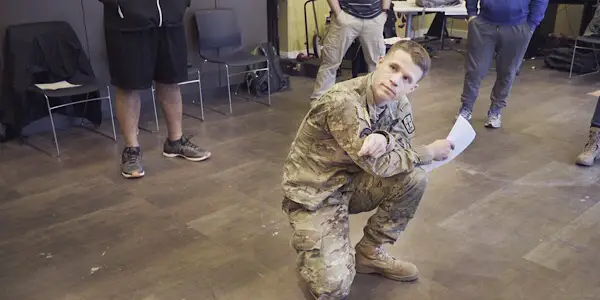
Absolutely. Programs like this are very important, do you think a documentary like this can help ensure their survival?
Jeffrey Wright: We just want to be a part of spreading the news. The vets express firsthand what a program like this has done for them and how important it is and that message needs to be received clearly and ideally yes, a greater awareness through a film like this will ideally contribute to expanding the work of community building artworks and the work of organization like it that are undertaking this work. There aren’t many of those, but certainly one of the missions of community building art work is to expand programs like this to as many people as possible because the need is nationwide and beyond our borders. So absolutely, I hope that by providing a window on this work that it can be expanded and can also inspire others towards these programs and techniques and towards the art and self-expression and as AV says: a greater openness that leads to healing.
A.V.: Can I add something to that?
Of course!
A.V.: I just wanted to say something I wanted people to take away from this, as well as what Jeffrey said, veterans don’t always have to put a tough face. It’s ok to be vulnerable and it’s ok to tell your stories and it’s ok to hurt, it’s ok to cry, it’s ok to be open and I’m hoping that everyone will see, a lot of people who know people from the military know that I never shed a tear and that there’s a different side of me that people haven’t seen before and I’m hoping that me being vulnerable will give them the courage to do the same and know that it’s ok to heal.
I hope so too, and I really appreciate you two taking the time today. I think this is a tremendous thing you’ve done.
The film premieres on HBO November 8th.
Does content like this matter to you?
Become a Member and support film journalism. Unlock access to all of Film Inquiry`s great articles. Join a community of like-minded readers who are passionate about cinema - get access to our private members Network, give back to independent filmmakers, and more.
Kristy Strouse is the Owner/Editor in Chief of Film Inquiry, writer, podcaster, and all around film and TV fanatic. She's also VP of Genomic Operations at Katch Data and is a member of The Online Association of Female Film Critics and The Hollywood Creative Alliance. She also has a horror website: Wonderfully Weird & Horrifying.













